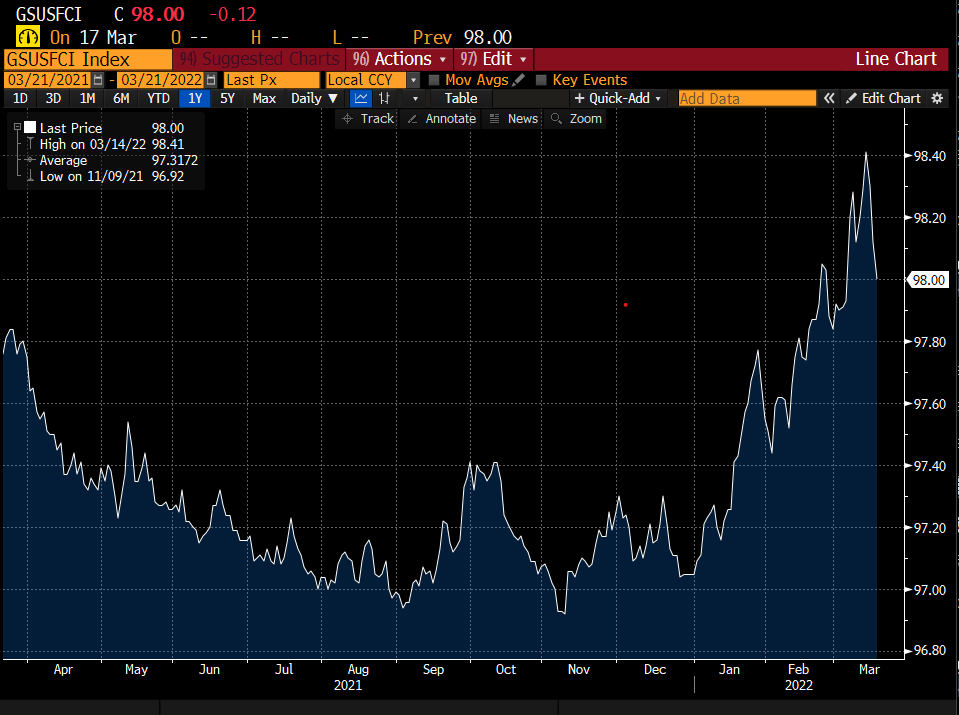Send it in Jerome?
The Fed's gradual rate hike cycle is too slow to appropriately deal with inflation. Awakening the market vigilantes is a bad idea. Sell US$ vs hard assets and sell US fixed income until Fed wakes up.
After Jerome Powell kicked off March Madness last week with the Fed’s decision to finally begin its rate tightening cycle, I was reminded of Bill Raftery’s legendary call on Jerome Lane’s dunk back in 1988, perhaps the greatest dunk with the greatest call in NCAA history.
While Jerome’s Fed announced its plan to prevent inflationary expectations from becoming well entrenched in society, the reaction to this plan suggested that the market doesn’t yet believe the Fed is being serious about arresting these inflationary concerns. The market reacted to the news by rallying stocks, tightening credit spreads, reducing volatility and raising higher inflation breakeven yields, all of which loosened financial conditions, precisely the opposite of what the Fed was trying to do in order to help snuff out inflation. Goldman’s Financial Conditions index loosened nicely last week as seen below (lower is looser). The market was looking for Powell to “Send It In” as Raftery would say. Unfortunately, he didn’t.
Source: Bloomberg
The Fed naively thinks that it can raise interest rates 25bps every 6 weeks and this will be enough to remove the inflationary mindset from embedding itself into the collective psyche of Americans. This view is based on the nostalgia of the US$ acting as the global reserve currency where the US$ and interest rates never price as if the US is having a balance of payments issue because the Fed can just print money and force foreigners to buy treasuries. Regrettably however, this view is no longer accurate. Their view fails to recognize that the US$ no longer holds exclusive hegemonic status in global reserve markets, particularly after the events of 2/26/22 when the US froze Russia's central bank reserves, an event we have discussed as being potentially as important as Nixon removing the $’s gold backing back in 1971. Foreign central banks will no longer to want to hold as many US$ reserves now because of fear of freezing/expropriation that could happen if they are deemed a “bad actor” by the US government, a title that most countries around the world have found themselves given by the US over the last 80+ years. And as we have discussed, now that China is able to price its purchases of commodities, particularly oil, in RMB instead of US$, foreign central banks no longer need to buy as many USTs any more as they can trade directly with China in RMB. Foreign central banks have been net sellers of USTs since 2014. We expect this trend to accelerate going forward, adding pressure to interest rates at a time when the Fed itself has also stopped buying them. This is not a great setup for US bonds.
The game has changed. When an Emerging Market country has a central bank that doesn't deal with its inflation in a serious manner, its currency weakens and its sovereign debt interest rates rise until the central bank is forced to get serious in order to defend the currency. Unfortunately for the US, the Fed doesn't yet realize that the US is now an Emerging Market but if we walk like an EM and talk like an EM, we are in fact an EM. The US continues to run massive current account deficits while foreigners are increasingly moving away from buying USTs as our inflation is spiraling higher in a deglobalizing world. China weaponizing the supply chain while Russia weaponizes its energy resources will keep inflation stickier for longer, offsetting structural deflationary forces that most investors are accustomed to from technology gains over the last few decades. The Fed’s only job was to prevent inflationary expectations become embedded in society. They are failing on this point.
We will continue to sell bonds and sell US$ against hard assets/inflation plays until the Fed is forced to “Send It In” and get serious to stomp out inflation with a more aggressive tightening cycle that causes a recession (Volcker style) to remove those expectations.
*Important Disclaimer: This blog is for educational purposes only. I am not a financial advisor and nothing I post is investment advice. The securities I discuss are considered highly risky so do you own due diligence.



It is truly remarkable how poorly run the Fed is and how “people” thought we could just print money and not experience the consequences. Sadly - there are too many examples of stupidity to count. I am sad for our children.